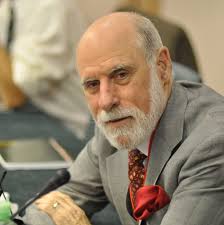Vint Cerf [1943-0] American    
Rank: 101
Scientist, Inventor
Vinton Gray Cerf ForMemRS, is an American Internet pioneer, who is recognized as one of "the fathers of the Internet", sharing this title with TCP/IP co-inventor Bob Kahn. Communication, Technology, Computers, Freedom, History, Space, Amazing, Architecture, Business, Car, Design, Education, Government, Strength, Success |  |